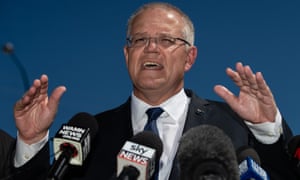As the election draws near, the Liberal party is trying to spook voters into backing the status quo
There is a spectre haunting Australia, the spectre of radical environmentalism. Or so at least the Liberal party want to have us believe.
As federal election fever mounts, Scott Morrison and his allies believe that at last they have found the phantom to spook voters into backing the status quo.
It is a magnificent bait and switch.
At a time when the Labor party
needs people to be looking ahead with confidence to a change of
government, Morrison has spent the last week trying to convince the
country that the Greens pose a “serious danger to Australia” against
which only he can protect us.As federal election fever mounts, Scott Morrison and his allies believe that at last they have found the phantom to spook voters into backing the status quo.
It is a magnificent bait and switch.
The Australian’s Paul Kelly goes even further. The Greens, he says, “pose a far more serious and sweeping threat to Australian life and society” than Pauline Hanson. They hate everything about Australia, from its colonial past to its industrial present, and they plan the “most sweeping change to the democratic system since federation”. Their very existence as a political party places us all at risk.
Such arguments are patently absurd.
No reasonable political observer could be fooled into believing there is any kind of moral equivalence between the reformist intentions of the Greens and the forces of white nationalism, or of any other radically extremist politics.
Indeed, worse than that. It is offensive to make such an argument at the very moment when the world is shaken by the very real horrors in Christchurch.
"Why are the prime minister and his allies persisting in making such an argument?"
There can be astonishingly few voters in Australia today who do not share that sense of offence, supporters and opponents of the Greens alike.
So why are the prime minister and his allies persisting in making such an argument?
It could, of course, be because they believe it. There may be some ideologues among the Liberals who are so blinded by their desire to avoid the transition to a non-carbon economy that they’re prepared to draw such ludicrous comparisons.
But it is more likely that they see arguments such as these as a trap for Labor as the election draws near.
This particular trap can work in two ways.
First, it can be a simple distraction technique.
Labor have placed the Coalition on the defensive with their attacks on Liberals’ and Nationals’ plans to preference One Nation candidates. Devoid of any arguments of their own, the Coalition is deploying instead what Liberal election strategist Lynton Crosby calls the “dead cat” technique. If you are ever losing an argument over dinner, Crosby is reported to say, then throw a dead cat on the table and all of a sudden everyone will be arguing about that instead.
In other words, if you can get everyone to argue about the Greens, then they won’t be arguing about One Nation any more. It doesn’t even matter if you end up conceding the point, because political debate will have moved on by then, and everyone will have forgotten what they were talking about initially.
Labor has avoided this trap so far, remaining laser-focused on the One Nation question, and avoiding discussion of the Greens issue almost entirely.
The second kind of trap is much more dangerous.
In this second version, the attack on the Greens is not intended just to distract. Instead, it is designed to push political debate directly on to territory on which the Coalition is much more comfortable.
In this way, attacking the radicalism of the Greens – their desire to challenge the social, economic and political status quo – is meant to elicit a distancing from Labor. What Morrison and colleagues want is for Labor to go into reassurance mode. They want Labor to stress the moderation of their own policies, to tack explicitly towards the centre and away from the so-called fringes of Australian electoral politics.
The reason they want that is because they know that when the dominant theme of an election is reassurance that benefits the incumbent party, especially when that is the party of the centre-right.
Labor will always struggle to win an election, especially from opposition, when it is trying to convince people that it can be trusted to be moderate and gentle, rather than when it is insisting that it can bring far-reaching change to the country.
Reassurance, in other words, is the terrain on which the Coalition wants to fight the election, because it is hostile terrain for Labor.
What makes this trap so dangerous is that many in Labor find it so hard to resist.
There are always people in labour parties worldwide who are sceptical of the electoral appeal of their own values and lack faith in their own ability to attract people to a positive agenda. That is why Labor parties are found so often cutting back on their radicalism, offering only the most cautious of versions of their own arguments.
But doing that almost always ends in failure. If Labor’s message to the country is grounded in stability and the status quo, rather than a willingness to rise to the scale of the challenges that we now face, then the country will likely end up backing the other side.
Elections are usually won by the side that sets the terms of the debate. If Labor are to prevail they need this to be a change election. And no raging against the extremes should be allowed to distract them from that goal.
• Marc Stears is director of the Sydney Policy Lab at the University of Sydne

No comments:
Post a Comment